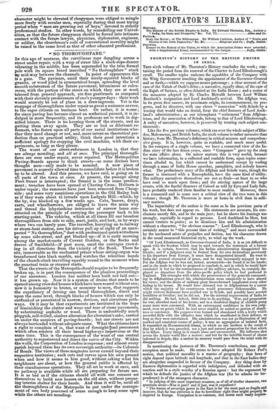"NO THOROUGHFARE."
Iw this age of neatness, the curvilinear rope dangling across a street under repair, with a wisp of straw like a slack-rope-dancer vibrating in the middle, has been superseded by the trim formal pole with its square board inscribed "No thoroughfare" stuck up mid-way between the channels. In point of appearance this is a gain. The paviours, amid their nicely-squared blocks of • granite, or wood piled in symmetrical heaps, spreading the level smooth substratum of the future pavement, bituminous or calca- reous, with the portion of the street on which they are at work tabooed from general approach, are fine gentlemen as compared with their slovenly predecessors of one's younger days : their work • would scarcely be out of place in a drawingroom. Yet is the stoppage of thoroughfares under repair as great a nuisance as ever, to the eager citizens on business bent. Or rather, it is worse ; for since paving has become almost an testhetical pursuit, it is in- dulged in more frequently, and its professors set to work in dig- nified leisure. There is no keeping them off the streets, and no getting them away again. They are as bad as dilettanti re- formers, who fasten upon all parts of our social institutions whe- ther they need change or not, and, more intent on theoretical per- fection than on practical utility, think their good intentions a sufficient apology for stopping the civil machine, with their ex- periments, as long as they please.
The worst of our street-reformers in London is, that they are always mending, and all at once. The principal thorough- fares are ever under repair, never repaired. The Metropolitan Paving-Boards appear to think streets—as some divines have thought men—only made to be mended. A new piece of pavement is scarcely allowed time to consolidate before it is broken up to be altered. And this process, we have said, is going on in all parts of the town at once. At present, the passage along Fleet Street is interrupted ; the Strand is in the same predica7
• ment ; trenches have been opened at Charing Cross ; Holborn is under repair ; the rammers have just been removed from Cheap- side ; and some very suspicious operations in the Old Bailey look as if they were about to intrude upon Ludgate Hill—which, by • the by; was blocked up a few 'weeks ago. Cabs, 'busses, drays, ' carts, and wheelbarrows, are obliged to leave the main" way and thread the labyrinthine intricacies of narrow lanes con- ' structed on the principle of carrying the passenger back to his starting-point. The vehicles, which at all times nil our broadest thoroughfares from side to side, meet, jostle, and lock, in by-ways where two can barely pass. The traveller, hurrying on to railway or steam-boat station, sees his driver pull up at sight of an unex- pected "No thoroughfare," dart with professional quickwittedness up some side-street, and get blocked up—if it is early morning among the market-carts of Covent Garden, or the flocks and droves of Smithfield—if past• noon, amid the carriages crowd- ing in all directions from the vicinity of the Bank. There he sits, immoveable as the enchanted prince whose sitting-organ was transformed into black marble, and watches the relentless hands of the church-clock travelling equably round to the moment when the punctual train or steamer starts. That the streets of the Metropolis should require to he frequently
broken up, is in part the consequence of the planless proceedings of our ancestors. London has neither been built nor laid out— it has grown up. Now it is a system of drains that needs to be opened among crowded houses which have been reared without one; now it is humanity to brutes, or economy to men, that suggests the expediency of driving one broad thoroughfare, direct and upon the same level, through blocks of houses which can only be outflanked or penetrated in narrow, devious, and circuitous path- ways. Or it may be that experiments are instituted in the hope of diminishing the clatter and wear and tear of stone pavements, by substituting asphalte or wood. There is undoubtedly much priggish, self-willed, aimless alteration for alteration's sake, carried on under the auspices of paving-boards ; but our streets are not always barricaded without adequate cause. What the citizens have a right to complain of is, that want of foresight rand preconcert which often renders all their broad highways impervious at the -same time. This is the consequence of the want of one central authority to superintend and direct the minis of the City. Within the walls, the Corporation of London is supreme ; and almost every parish beyond them has its own sovereign authority—its Colossus of Roads. The views of these magnates never extend beyond their respective territories ; each cuts and carves upon his own ground when and how it seems to him good, without asking what his neighbours are about, or how the general public is affected by their simultaneous operations. They all set to work at once, and no pathway is available while all are preparing for future use. It is as bad as if the citizens should all with one consent set themselves to build new houses on the old sites, without prepar- mg interim shelter for their beads. And thus it will be, until all the thoroughfares of the Metropolis be put under the manage- ment of one body possessed of sense enough to keep some open while the others are mending.


































 Previous page
Previous page